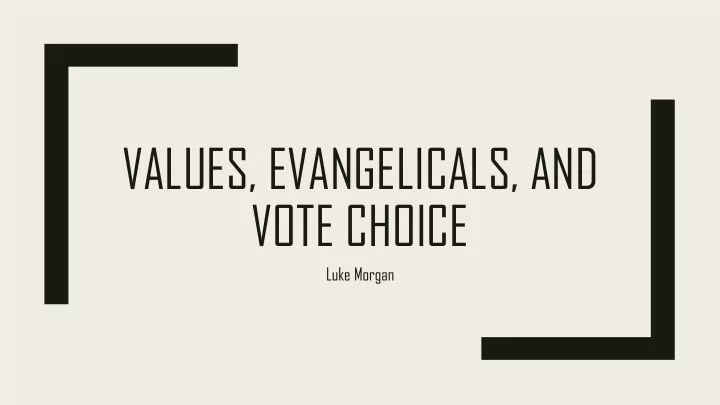

VALUES, EVANGELICALS, AND VOTE CHOICE Luke Morgan
Main Question Why did Evangelical Christians overwhelmingly vote for Donald Trump in the 2016 Presidential Election?
Thesis Evangelicals’ identification levels with basic personal values will not have as much of an impact on vote choice as the other independent variables will have.
Where We’re Going ■ Literature Review – Schwartz’ s Value Theory – Vote Choice – Evangelicalism – Religion and Basic Personal Values ■ Methodology ■ Preliminary Results and Analysis ■ Discussion
Literature Review: Schwartz’s Value Theory • Schwartz & Berkowitz, 1992 • Schwartz, 2005 • Schwartz & Sagiv, 1995 • Schwartz et al, 2013
Schwartz’s Value Theory Self-Di Directi ction: Independent thought and action; choosing, creating, exploring. ■ Sti timulati tion: Excitement, novelty, and challenge in life. ■ Hedonism: Pleasure and sensuous gratification for oneself. He ■ Ach chievement: Personal success through demonstrating competence according ■ to social standards. Power: Social status and prestige, control or dominance over people and ■ resources. Secu curity ty: Safety, harmony, and stability of society, of relationships, and of self. ■ Confo formity ty: Restraint of actions, inclinations, and impulses likely to upset or ■ harm others and violate social expectations or norms. Traditi tion: Respect, commitment, and acceptance of the customs and ideas ■ that traditional culture or religion provide the self. Benevolence ce: Preserving and enhancing the welfare of those with whom one is ■ in frequent personal contact. Universalism: Understanding, appreciation, tolerance, and protection for the ■ welfare of all people and for nature.
Schwartz’s Value Theory ■ Schwartz et al, 2017; Goren at al, 2016 — Basic personal values and core political values are entwined ■ Feldman, 2003 — Some values influence political beliefs and policy opinions more than others – Self-transcendence vs. conservation axis
Literature Review: Vote Choice ■ Niemi and Weisberg, 1976 — Elite vs. mass belief systems ■ Many Influences on Vote Choice – Party ID ■ Sears and Levy, 2003 — generational effects and age cohorts ■ Abramowitz and Saunders, 1998 — ideological and issue-position differences
Vote Choice ■ Influences on Vote Choice – Political Ideology ■ Bardes and Oldendick, 2017 — ideological identification and party identification – Demographics ■ Jackson and Carsey, 2002 — three predictors: race, gender, and income ■ Leege and Welch, 1989 — religion
Literature Review: Evangelicalism ■ Balmer, 2016; Bebbington, 2005 — Definition of Evangelicalism – 4 aspects: the Bible, the cross, conversion, and activism ■ Wilcox, 1988 — Historical Trends – 3 waves of political activism ■ 1920’s ■ Post-WWII McCarthyism ■ 1970’s
Literature Review: Religion and Basic Median Personal Values Universali salism sm 12 Benevolence 13 ■ Roccas, 2005 — relationship between Confo form rmity ty 12 religiosity and values Tradi aditi tion 11 ■ 2019 TREB study —Evangelical Christians’ Secur urity ty 13 value identification Power 8 Achievement 9 Hedonism Hed sm 10 Sti timul ulati ation 9 Self-Dir Directi tion 13
Methodology ■ Dataset ■ Variables and Recoding – Vote choice – Political ideology – Political party identification – Religiosity – Demographics – Motivational value type identification ■ SPSS and Logistic Regression
Preliminary Results: Trump vs. Other Votes
Preliminary Results: Vote for Trump vs. Did Not Vote
Discussion What is the direction of the relationship between values and ideology, political party identification, religion, and policy positions?
Recommend
More recommend